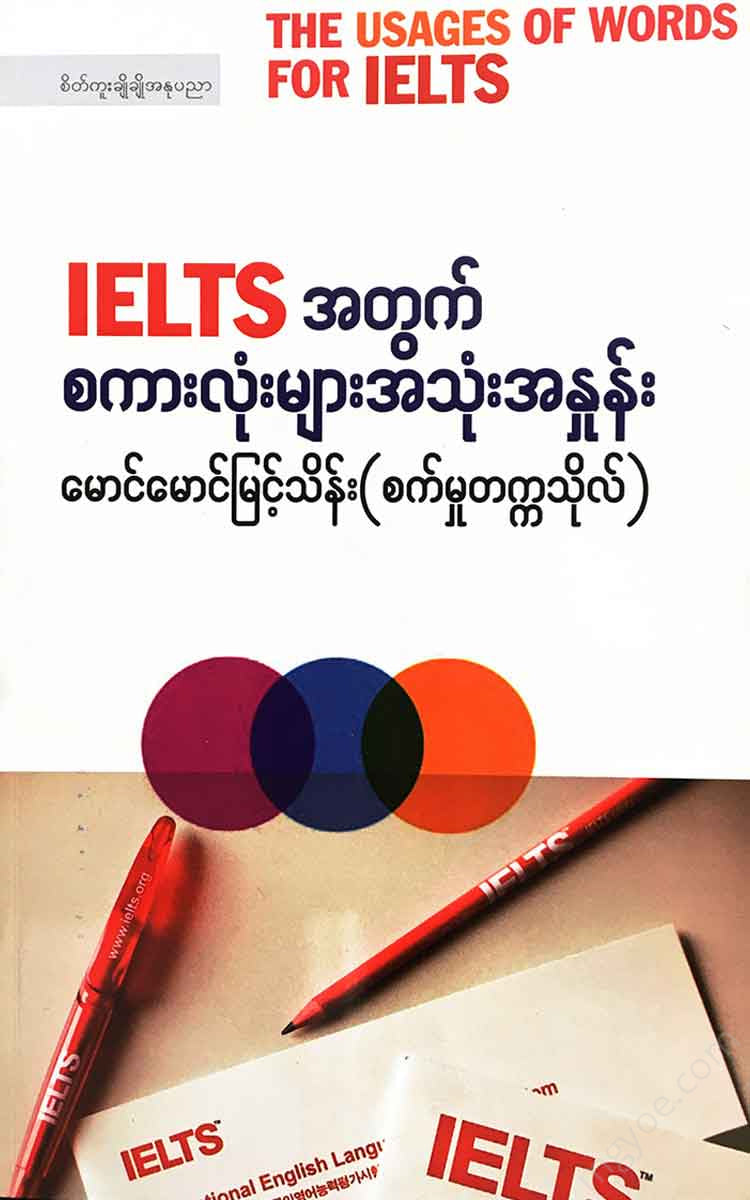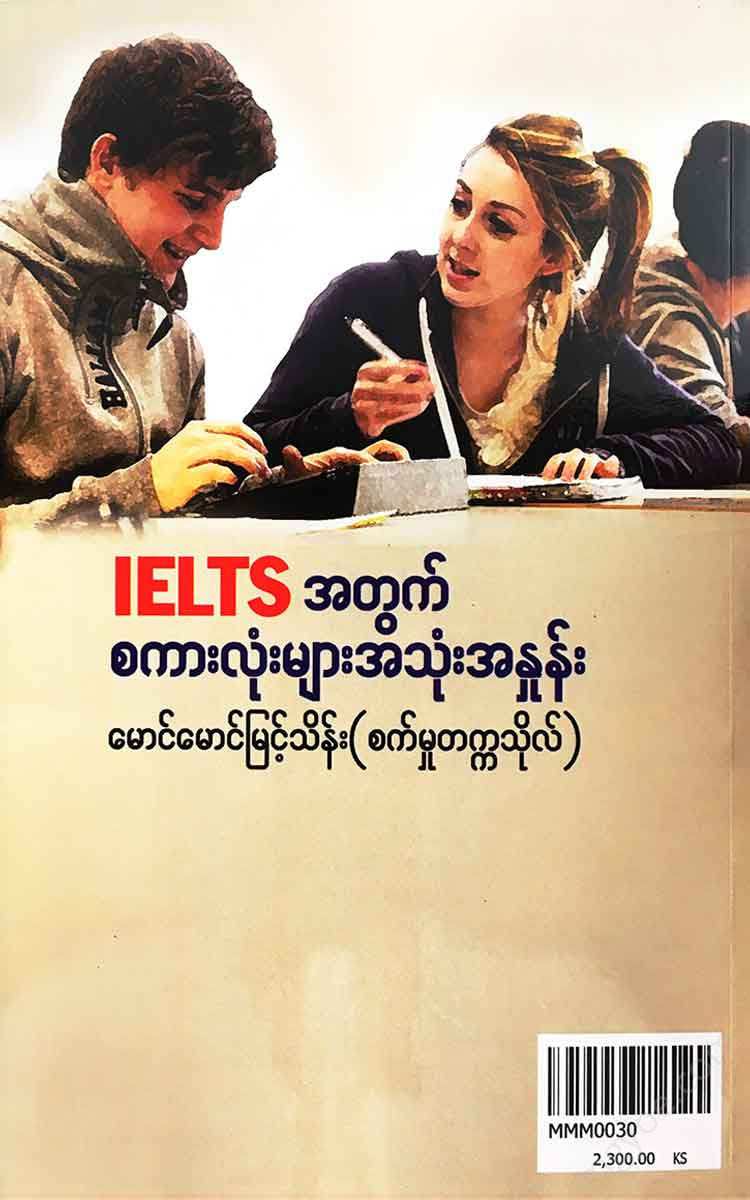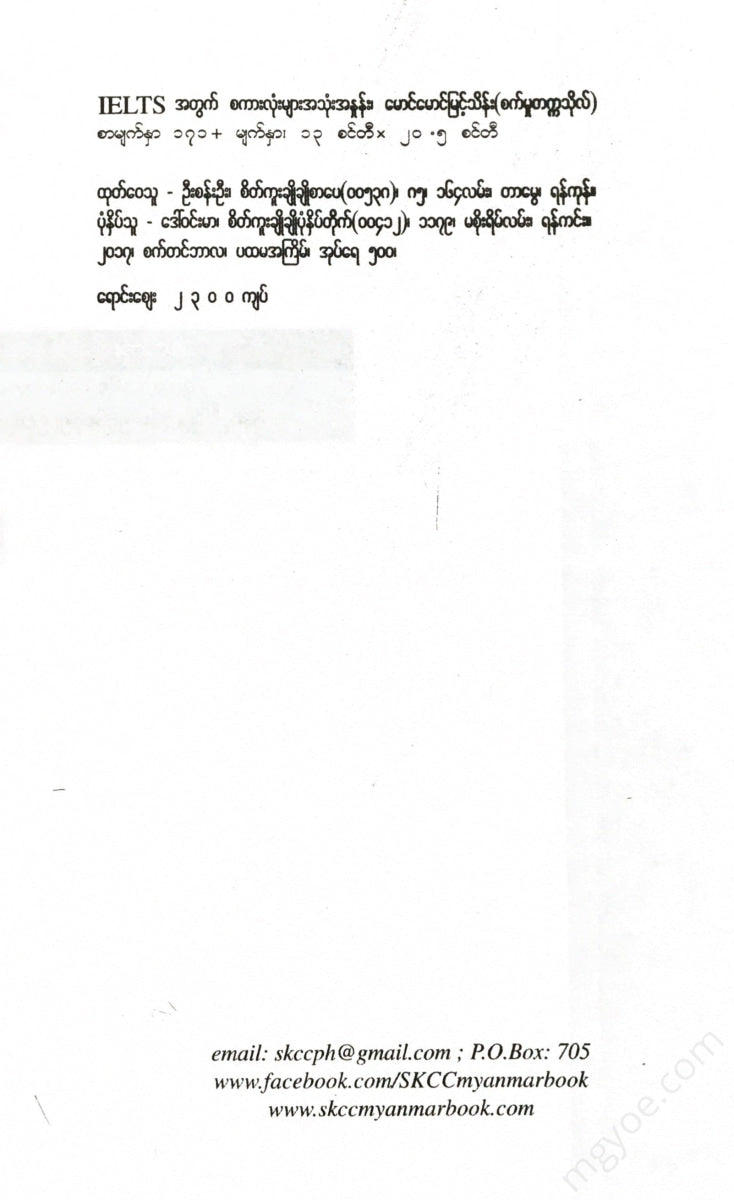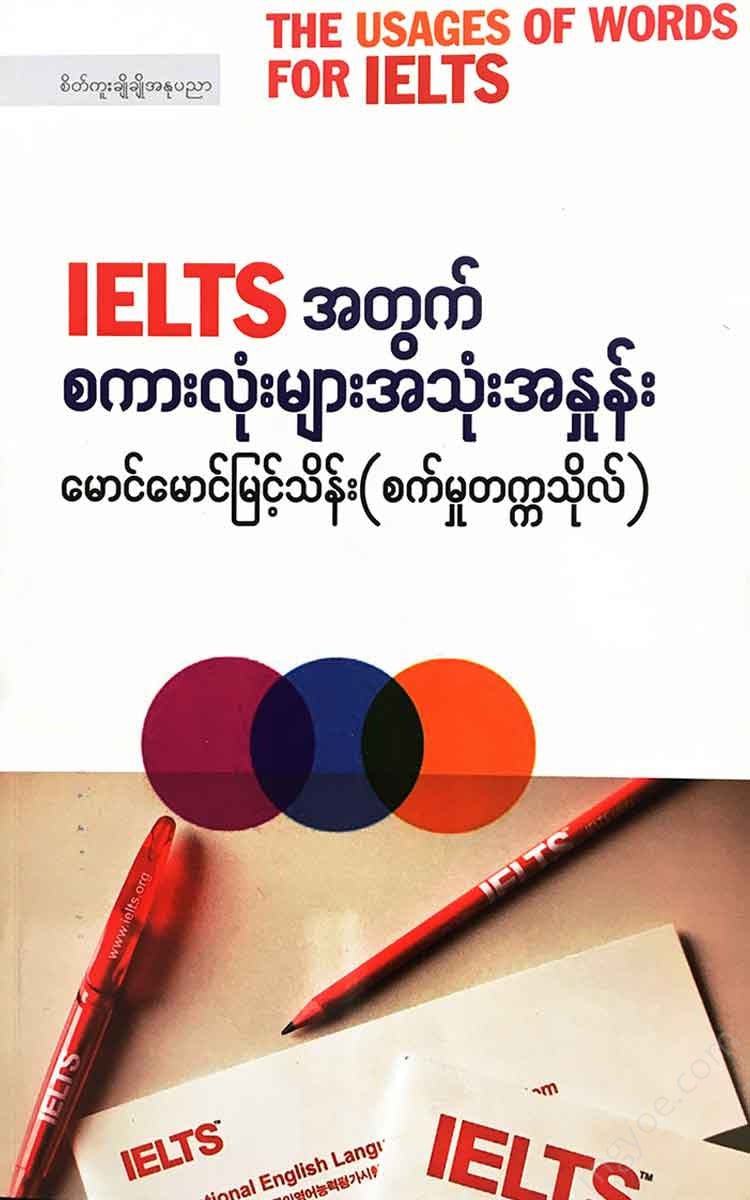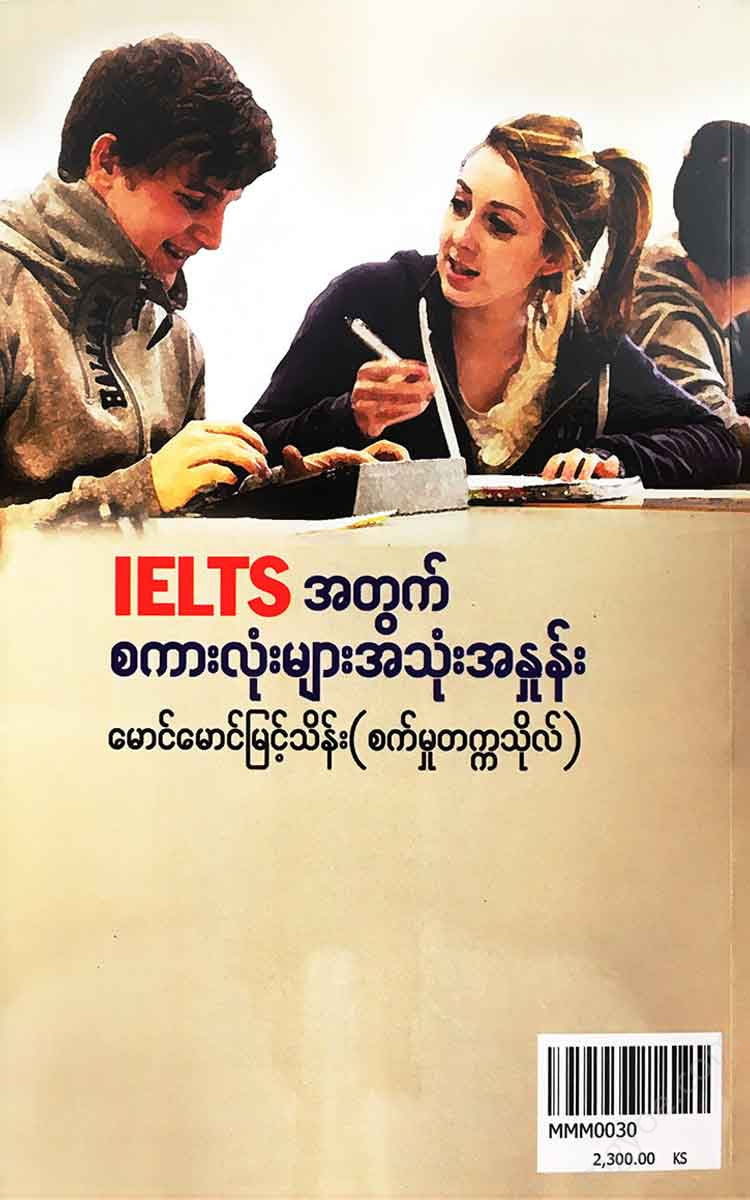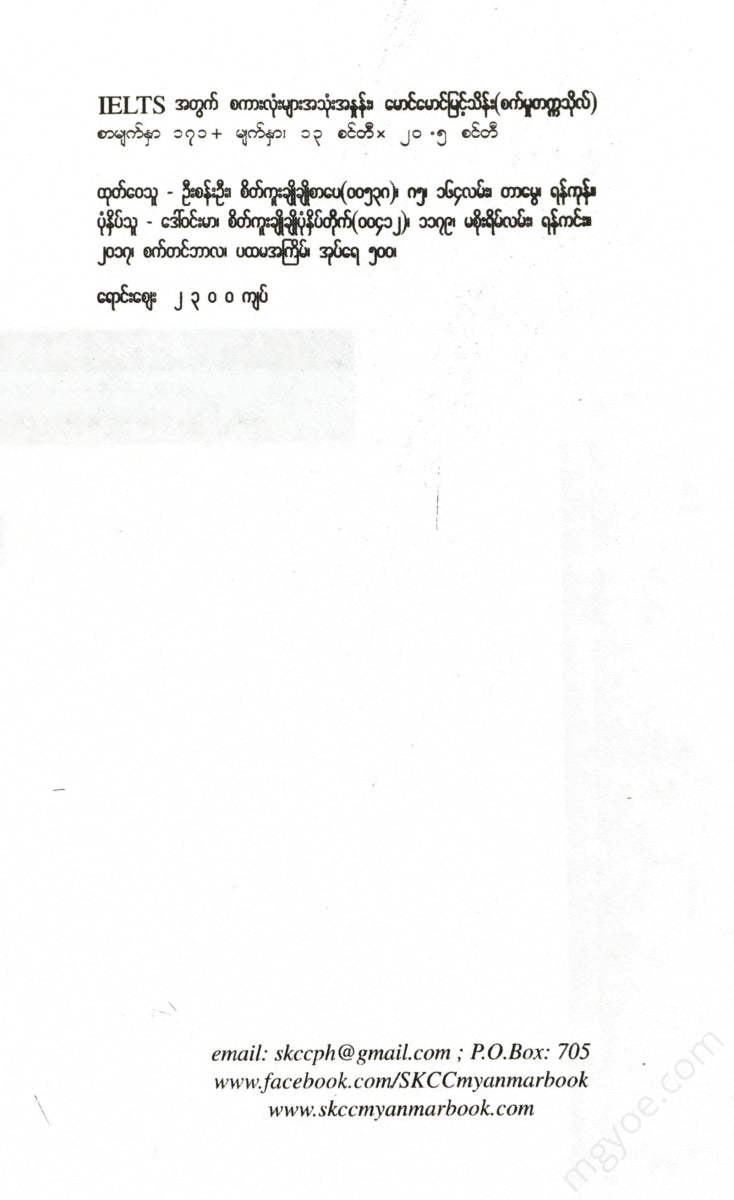စိတ်ကူးချိုချိုစာပေ
မောင်မောင်မြင့်သိန်း(စက်မှုတက္ကသိုလ်) - IELTS အတွက်စကားလုံးများအသုံးအနှုန်း(၁)
မောင်မောင်မြင့်သိန်း(စက်မှုတက္ကသိုလ်) - IELTS အတွက်စကားလုံးများအသုံးအနှုန်း(၁)
ထုတ်ယူရရှိနိုင်မှုကို မတင်နိုင်ခဲ့ပါ။
IELTS ဖြေဆိုတဲ့အခါ ဝေါဟာရများကို ပိုင်နိုင်ဖို့ လိုအပ်သလို စကားလုံးတွေ (Words) ရဲ့ အသုံးအနှုန်း (usage) တွေကိုလည်း သူ့ နေရာနဲ့သူ သုံးစွဲပြီး ဝါကျတွေ ဖွဲ့သီတတ်ဖို့ အရေးကြီးပါတယ်။ စကားလုံး တွေရဲ့ ကွဲပြားတဲ့အသုံးအနှုန်းတွေ သိရှိလေ့လာနိုင်ဖို့ စုစည်းတင်ပြလိုက် ပါတယ်။
အခန်း(၁)
- Personality and Character
Personality & Character ဟာ အလွန်နီးစပ်စပ်ရှိတဲ့ အဓိပ္ပာယ်ဖြစ်ပေမဲ့ တူညီတဲ့နည်းလမ်းနဲ့ အမြဲမသုံးပါဘူး။
(a) Personality ရဲ့ အဓိပ္ပာယ်ကတော့ အထူးသဖြင့် လူမှုရေးအရသင်ပြုမူတဲ့၊ ခံစားတဲ့၊ စဉ်းစားတွေးတောတဲ့ နည်းလမ်းကို ဆိုလို ပါတယ်။ တိုက်ရိုက်အားဖြင့် ပင်ကိုစရိုက်၊ ကိုယ်ရည်ကိုယ်သွေးလို့ အဓိပ္ပာယ်
ဖွင့်ကြပါတယ်။
e.g., She's always the life and soul of the party because she has such a bubbly personality.
သူမမှာ အဖွဲ့ ရဲ့ ဘဝရဲ့ စိတ်ရင်းစိတ်ထား အစဉ်အမြဲရှိတယ် ဘာ့ကြောင့် လဲဆိုတော့ သူမမှာ အဲဒီလိုတက်ကြွပျော်ရွှင်တဲ့ ပင်ကိုစရိုက်ရှိလို့ပါပဲ။ Personality ကို plural noun(အများကိန်းနာမ်) အနေနဲ့ အသုံးပြုနိုင်ပါတယ်။
e.g., I didn't get along with my business partner because our personalities clashed.
ကျွန်တော်ရဲ့ ပင်ကိုစရိုက်တွေ သဘောထားချင်း ကွဲလွဲတဲ့အတွက်ကြောင့် ကျွန်တော်ဟာ ကျွန်တော့်ရဲ့ စီးပွားရေးလုပ်ဖော်ကိုင်ဖက် ပါတနာနဲ့အဆင်မပြေခဲ့ပါဘူး။
(b) Characteristic=things that are typical or noticeable abouta person or thing.
(It can be a noun or an adjective)
လူပုဂ္ဂိုလ်တစ်ဦး (သို့) အရာဝတ္ထုပစ္စည်းတစ်ခုနဲ့ ပတ်သက်လို့ ပုံစံကျတဲ့ (သို့) သတိပြုဖွယ်ကောင်းတဲ့ အရာတွေကို Characteristic လို့ခေါ်ပါတယ်။ ဒီစကားလုံးကို နာမ်(သို့) နာမဝိသေသနအနေနဲ့ အသုံး ပြုနိုင်ပါတယ်။ Characteristic ကို noun အနေနဲ့ ထူးခြားသော ပင်ကိုလက္ခဏာကိုလို့ အဓိပ္ပာယ်ဖွင့်နိုင်ပြီး Adjective အနေနဲ့ ထူးခြားသောလို့ ယူဆနိုင်ပါတယ်။
e.g. Children may display Characteristics of either of their parents.
ကလေးတွေက သူတို့ မိဘတစ်ဦးဦးရဲ့ ထူးခြားတဲ့ ပင်ကိုလက္ခဏာ တွေကို ပြသနိုင်ပါတယ်။
- Change
(a) Change is often used in the active form when it has a passive sense.
Change (ပြောင်းလဲမှု ပြောင်းလဲသည်) စကားလုံးဟာ ပြုလုပ်ခံရတဲ့ passive အဖြစ်ရှိပေမဲ့ ပြုလုပ်မှုပြပုံစံ Active form မှာ မကြာခဏအသုံးပြုပါတယ်။
e.g., My home town has changed recently.
ကျွန်တော်တို့မြို့ဟာ မကြာသေးမီက ပြောင်းလဲခဲ့ပြီး ဖြစ်ပါတယ်။
ဆိုလိုတာက My home town has been changed recently လို့သုံးလို့မရပါ။ (passive voice)
(b) Try to use a range of adjective and adverbs to intensity
(or) weaken the word 'change'.
Changeဆိုတဲ့ စကားလုံး အားနည်းစေဖို့ (သို့) ပြင်းထန်စေဖို့ Adjective နဲ့ Adverbs တွေကို အသုံးပြုဖို့ ကြိုးစားပါ။
e.g. (1) There was a profound change in attitudes.
သဘောထားအမြင်တွေမှာ လေးနက်ကြီးကျယ်တဲ့ ပြောင်းလဲမှု တစ်ခု ရှိခဲ့ပါတယ်။
e.g. (2) Attitudes changed completely
သဘောထားအမြင်တွေ လုံးဝပြောင်းလဲခဲ့တယ်။ ။
Attitudes had a big change လို့အသုံးပါနဲ့။
(C) Change ရဲ့ နောက်မှာ အသုံးပြုတဲ့ preposition တွေကို ဂရုစိုက်ပါ။
e.g. (1) There has been a change in our plans.
ကျွန်တော်တိုရဲ့ စီမံချက်တွေမှာ ပြောင်းလဲမှုတစ်ခုရှိခဲ့ပါပြီ။
e.g. (2) We have made some change to the design.
ကျွန်တော်တို့ဟာ ဒီဇိုင်းမှာ ပြောင်းလဲမှုအချို့ ပြုလုပ်ထားပြီးပါပြီ။
- Individuality/ behaviour/ originality
(a) The words individuality and behaviour are almost always used in the singular, not the plural. Individuality နဲ့ behaviour စကားလုံးတွေဟာ အများကိန်းအနေနဲ့မသုံးဘဲ အနည်းကိန်းအနေနဲ့ အစဉ်အမြဲသုံးလေ့ရှိပါတယ်။
e.g.(1) Everyone should try to maintain their individuality.
လူတိုင်းဟာ သူတို့ရဲ့ တစ်ဦးချင်း ပုဂ္ဂလိကဖြစ်မှု (သီးခြားဖြစ်မှု)ကိုထိန်းသိမ်းဖို့ ကြိုးစားသင့်ပါတယ်။
e.g(2) Parents are responsible for their children's behaviour.
မိဘတွေက သူတို့သားသမီးတွေရဲ့ အပြုအမူကို တာဝန်ယူရပါတယ်။
(b) Originality is used to refer to a piece of work that is not copied from others. Originality ကိုတော့တခြားသူတွေမှ အတုယူခြင်းမဟုတ်တဲ့ အလုပ်အစိတ်အပိုင်းကို ရည်ညွန်းဖို့ အသုံးပြုပါတယ်။
e.g I don't like his style, but you have to admire the originality of his work.
ကျွန်တော်ကတော့ သူ့ပုံစံကို မနှစ်သက်ပါဘူး။ ဒါပေမဲ့ မင်းအနေနဲ့ သူ့အလုပ်ရဲ့ တစ်မူထူးခြားစိတ်ဝင်စားစရာကောင်းတဲ့ အမျိုးအစား ကိုနှစ်သက် သဘောကျရလိမ့်မယ်။
- 4. Community
Community ကို Collocations နဲ့တွဲသုံးလေ့ရှိပါတယ်။ လူမှုအသိုက်အမြုံသဘော အဓိပ္ပာယ်ယူနိုင်ပါတယ်။ e.g(1) rural community (ကျေးလက်မလူမှုအသိုက်အမြုံ)
e.g(2) ethnic community(လူမျိုးစုအသိုက်အမြုံ)
- Absolutely/ Extremely
(a) Extreme adjective တွေဖြစ်တဲ့ impossible, starving, disastrous တွေကို extreme adverb တွေနဲ့သာ အသုံးပြုနိင်ပါတယ်။
e.g(1) absolutely (လုံးဝ)
e.g(2) extremely (အလွန်အမင်း)
e.g(1) It is absolutely impossible for governments to control our unsatisfaction.
ကျွန်တော်တို့ရဲ့ မကျေနပ်ချက်တွေကို ထိန်းချုပ်ဖို့ အစိုးရတွေအတွက် လုံးဝမဖြစ်နိုင်ပါဘူး။
e.g(2) When I was diagnosed with diabetes, they told me I couldn't eat chocolate. Which I found extremely difficult.
ကျွန်တော်ဟာ ဆီးချိုရောဂါကို ရောဂါရှာဖွေခဲ့တဲ့အခါ ကျွန်တော် ချောကလက်မစားရသေးဘူးလို့ သူတို့ကပြောခဲ့တယ်။ ဒါဟာ ကျွန်တော့်အတွက်တော့ အလွန်အမင်း ခက်ခဲစေပါတယ်။
(b) 'Extremely' is used with the same kind of adjectives as very and so is not extreme adverb.
Extremely ကိုတချို့အလားတူ Adjectiveတွေဖြစ်တဲ့ very နဲ့ so နဲ့အတူ အသုံးပြုတဲ့အခါ extreme adverb မဟုတ်တော့ဘူး။ Most adjectives which can be used with 'very' can also be used with highly, slightly and extremely.
very နဲ့အသုံးပြုနိင်တဲ့ Adjective အများစုဟာ highly, slightly နဲ့ extremely နဲ့ အသုံးပြုနိုင်ပါတယ်။
e.g(1) We found that the acidity of the soil was slightly lower than the week before.
မြေသားရဲ့ အက်ဆစ်ဓာတ်ဟာ ယခင်သီတင်းပတ်ထက် အနည်းငယ်ပိုနည်းတယ်ဆိုတာ ကျွန်တော်တို့တွေ့ခဲ့ပါတယ်။
e.g(2) The coastline has been spoiled by the illegal dumping of highly toxic industrial waste.
ပင်လယ်ကမ်းရိုးတန်းဟာ အလွန်အမင်းအဆိပ်ရှိတဲ့ စက်မှုလုပ်ငန်း စွန့်ပစ်ပစ္စည်းတွေ တရားမဝင် စွန့်ပစ်ခြင်းကြောင့် ပျက်စီးသွားပါပြီ။
